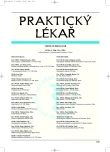-
Medical journals
- Career
Implication of molecular genetic examination in a three generational family with multiple endocrine neoplasia type 2A
Authors: V. Holub 1; Š. Dvořáková 1; E. Václavíková 1; A. Ryška 2; J. Čáp 3; P. Vlček 4; J. Dušková 5; D. Kodetová 6; Z. Novák 1; B. Bendlová 1
Authors‘ workplace: Endokrinologický ústav Ředitel: doc. MUDr Vojtěch Hainer, CSc. 1; Fingerlandův ústav patologie, LF UK a FN Hradec Králové Přednosta: doc. MUDr. Aleš Ryška, PhD. 2; II. interní klinika LF UK a FN Hradec Králové Přednosta: prof. MUDr. Jaroslav Malý, CSc. 3; Klinika nukleární medicíny a endokrinologie 2. LF UK a FN Motol Přednosta: doc. MUDr. Petr Vlček, CSc. 4; Ústav patologie 1. LF a VFN Praha Přednosta: prof. MUDr. Ctibor Povýšil, DrSc. 5; Ústav patologie a molekulární medicíny, 2. LF UK a FN Motol Přednosta: prof. MUDr. Roman Kodet, CSc. 6
Published in: Prakt. Lék. 2007; 87(3): 157-159
Category: Of different specialties
Overview
Medullary thyroid cancer (MTC) is a rare form of thyroid cancer accounting for about 10 % of all thyroid malignancies. It occurs mostly as a sporadic tumour or in association with autosomal dominant inherited cancer syndromes - multiple endocrine neoplasia (MEN) types 2A and 2B and familial MTC. Germline mutations in the RET proto-oncogene were found in most of the familial cases. Here we describe molecular genetic detection in one MEN2A family with three generations, where we found a double germline mutation in exons 10 (Cys620Phe) and 13 (Tyr791Phe) of the RET proto-oncogene.
Key words:
medullary thyroid cancer, molecular genetics, MEN2A syndrome, RET proto-oncogene.
Labels
General practitioner for children and adolescents General practitioner for adults
Article was published inGeneral Practitioner

2007 Issue 3-
All articles in this issue
- An asymptomatic form of primary hyperparathyroidism – accidental finding.
- Thyroid cancer and malignant lymphoma – is there a relationship?
- Spectral analysis of heart rate variability in persons with mild subclinical hypothyroidism
- Testosterone replacement therapy in aging men.
- Physical activity and obesity.
- The treatment of obesity – Current trends and future perspectives
- Thyroid disease in the GP’s practice
- Glycaemic index of carbohydrates – relation to obesity.
- Health Spa weight management and its influence on anthropometric, psychobehavioural and hormonal indices
- Implication of molecular genetic examination in a three generational family with multiple endocrine neoplasia type 2A
- Diabetes mellitus type 1 (DM 1) and autoimmune thyroiditis as a complication of Interferon alpha treatment.
- The day to day life of Czech diabetic patients: Psychosomatic problems of diabetes.
- Drug-induced gynecomastia
- Autoimmune polyglandular syndrome type 2 in the general practitioner’s surgery.
- ACTH-dependent Cushing’s syndrome due to a carcinoid tumour Cushing’s
- General Practitioner
- Journal archive
- Current issue
- Online only
- About the journal
Most read in this issue- Testosterone replacement therapy in aging men.
- Drug-induced gynecomastia
- ACTH-dependent Cushing’s syndrome due to a carcinoid tumour Cushing’s
- Thyroid cancer and malignant lymphoma – is there a relationship?
Login#ADS_BOTTOM_SCRIPTS#Forgotten passwordEnter the email address that you registered with. We will send you instructions on how to set a new password.
- Career

